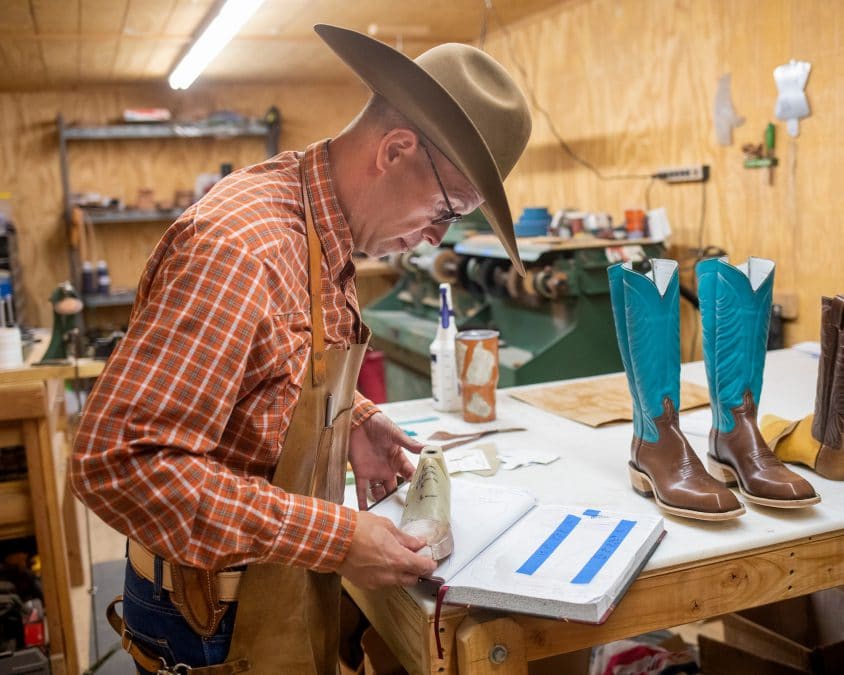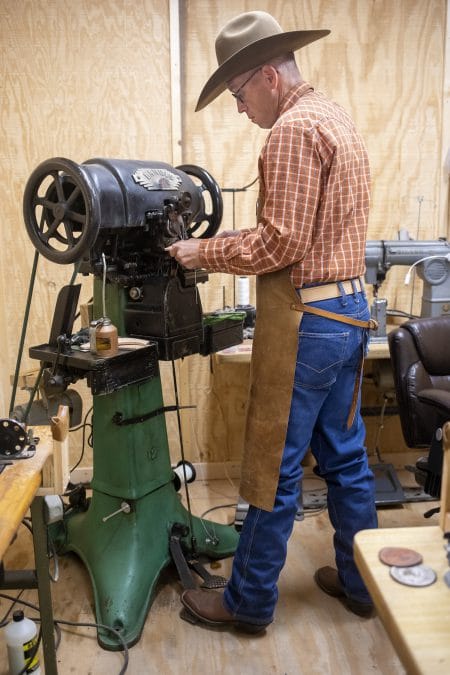Citizen Potawatomi Nation tribal member Terry Don Peltier began his business Top Hand Boots located near Prague, Oklahoma, four years ago. He loves cowboy boots — a combination of versatility, strength and rugged beauty. The Peltier family descendant’s collection spans both his closet and the workshop in his barn.
“I like Western culture. I raise cattle. I raise horses. And I’ve always had a fascination with cowboy boots. I don’t know what that is, but I’ve always had a fascination with cowboy boots,” he said.
Peltier remains dedicated to his craft after learning the basics six years ago. Now a skilled bootmaker, he handmakes footwear for friends, family and clients.
“There is nothing that’s pre-manufactured,” he said. “It all started out as a flat piece of leather at one time, and (you) cut it out and you mold it. You stitch it all together. … The thing that makes it so gratifying is when that person puts that boot on their foot, and you see that smile and how happy with the fit, that’s what makes it all worthwhile, right there.”

Preserving the craft
Peltier spent more than 26 years in the oil industry before its downturn in 2015. He has always enjoyed working with his hands and chose to learn how to make cowboy boots, a physical process that requires precision and patience. Peltier then spent two weeks as an apprentice in Texas.
“And I just knew barely just enough to be dangerous when I got out of that,” he said and laughed.
He continued to learn from others, and developed his own style and way of working. Peltier also built a workshop in his barn and spent two years traveling throughout the Southwestern United States collecting equipment from retired bootmakers. The refurbished parts fill the 14-by-40-feet workspace.
“Some of it’s right after the turn of the century, the 1900s. That’s how old this stuff is,” he said. “I got a Singer sewing machine that I stitch on that was made in like 1923, and I’ve got another machine that I stitch the souls. That was made in 1944, during (World War II). So, all this stuff is either being found in a scrap bin, or no one knows what it is and it’s just getting hauled off.”
Peltier and other bootmakers from across Oklahoma meet up a couple of times a year. They number fewer than 10, with some of them forced into retirement by arthritis and other health complications. The two that taught Peltier no longer practice their craft.
“I honestly think that, especially with some of these master bootmakers that are older and actually, you know, they’re passing away, a lot of this knowledge I don’t think is getting passed on,” he said.

The right fit
Peltier considers a good pair of boots an essential piece of equipment for a cowboy, and the fit often determines their utility. There is little to no breaking in a pair from his shop.
“I take most of the stretch out (of the leather), and when you put them on your feet, they should be like a glove,” he said.
“I’ve had people put on a pair of custom made boots, and they’re like, ‘All right. I’m done. I’m done with going and getting a pair off the shelf.’”
Clients receive five different measurements on their feet before Peltier builds a pair of custom boots. He uses somewhat unconventional equipment to ensure a perfect fit, including where he records the information.
“I have an old accounting journal — one of them old-time accounting journals that are about a foot and a half long, and you open it up. Well, I set their foot on there, and then I trace the outline,” Peltier said.
He spends up to two hours with a client, designing and measuring for their one-of-a-kind pair. Peltier knows they enjoy participating in the process and picking out their leather, stitching, heel height and more. Some people’s specifications cover everything down to the color of the thread.
“Or they’ll just tell me, ‘Hey, you’re the bootmaker. Surprise me,’ which when someone tells me that, I like that because it gives me my freedom to try new things,” Peltier said.
His collection from antique shops and thrift stores inspires him as well as the desire to keep designs alive that he learned and received from other master makers. Peltier also believes his creativity comes from men on the Potawatomi side of his family, which adds pride to his work.
“A lot of my artistic ability was from, of course, my grandfather and my dad,” he said. “My grandfather, he would sit down with me, and he was really good at sketching and stuff like that. And my dad, he was a wood carver, so I think that’s where I got my artistic eye from was from them two.”
Raymond Peltier, his grandfather, was chairman of the Tribe in 1974, and is the namesake of CPN’s Raymond Peltier RV Park.
A pair of Top Hand Boots starts at $600 and takes Peltier approximately 40 hours to complete. He also requires a six-month work period, although he often completes them sooner. Find Top Hand Boots on Facebook @TopHandBoots.
